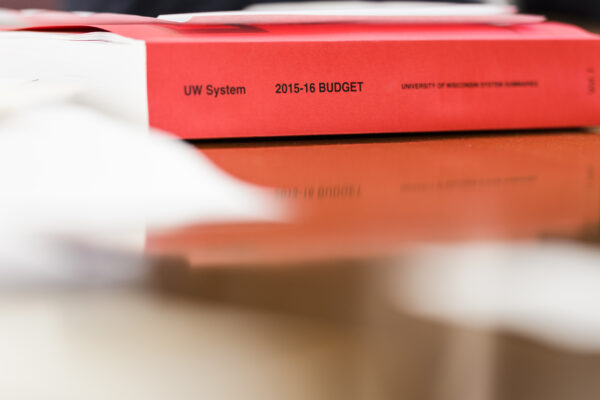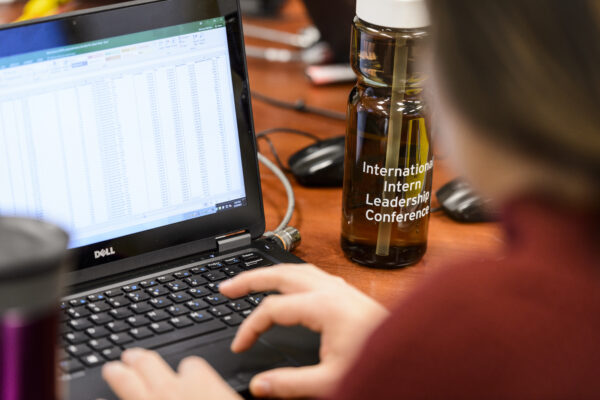To deliver efficiencies, improve our financial outlook, and create a better work environment for staff, ATP will streamline finance operations and create an administration that adapts and grows as we do. Our goal is to redesign essential finance processes so we can access more accurate data for decision-making, expand our reporting capabilities, and increase the security of our financial information.
To make this possible, the Universities of Wisconsin Administration (UWSA) has selected Workday to replace the PeopleSoft-supported Shared Financial System (SFS). Workday’s integrated platform will bring finance functions into a single system and let share information easily between different administrative units and areas, including research administration and human resources.
ATP is a people-first project. Our Finance Strategy Team has spoken with hundreds of staff members from all 13 UW universities and gathered valuable information about current systems and future needs. We will continue to involve staff as we work on processes, policies, and system design.
What's Involved
Collaborations and conversations with faculty and staff at all UW universities have helped us understand the current state of our financial systems. From completing daily work to year-end reporting, almost every aspect of the way we perform finance functions will be modernized.
We have agreed that making the following foundational changes is a critical step toward unifying finance business processes and workflows.
Transitioning to Accrual Accounting
Staff across the UW expressed a willingness to transition to accrual accounting, in which revenues are reflected as they are earned and expenses as they are incurred. Benefits include more accurate operating results and better cash-flow forecasting.

Redesigning the Chart of Accounts
Redesigning the chart of accounts (COA) with clear values that align with Workday will resolve many of our current challenges. The goal is to provide a COA that can be used by all institutions and a better design to meet external reporting needs.

Retiring UDDS (Unit, Division, Department, Sub-Department)
By retiring UDDS and aligning our new system with Workday, we will establish a single source of truth for organizational values. A new organizational structure will provide standardized information and a solid foundation for future growth.

Working in Workday
Expand the fields below to see which processes and tasks will be performed within Workday’s Financial Management (FIN) suite.
This is an accordion element with a series of buttons that open and close related content panels.
Accounts Receivable
The end-to-end accounts receivable process supports billing and revenue collection. New processes will maximize our collection of delinquent accounts receivable and minimize the administrative cost of those efforts. Specifically, we will update the way we handle invoice generation, adjustments, cancelations, write-offs, collection efforts, and payment applications.
Budget
The end-to-end budget process supports the annual and multi-year budgeting plans for the University of Wisconsin System. This includes budgets and allotments, budget transfers, revenues, expenditures, reconciliation, forecasting, and reporting.
Cash Management
The end-to-end cash management process supports the preparation and execution of financing and capital measures. This includes the maintenance of our cash position, management of cash operations, banking, and state appropriations.
Expenses
The end-to-end expenses process supports the reimbursement of travel and non-travel-related expenses. It applies to any miscellaneous travel expenses paid on behalf of or reimbursed to employees, students, contractors, invited guests, and other non-employees with university funds.
Fixed Assets
The end-to-end fixed assets process supports the accounting for and tracking of capital equipment and depreciation. Each institution ensures accountability for capital equipment and the accuracy of information for financial reports and indirect cost calculations.
General Ledger
The end-to-end general ledger process supports the data structure used for accounting and financial reporting, as well as cost or expense transfers.
Gifts and Endowments
The end-to-end gifts and endowments process supports the record, management, and spend of donations in the form of money and gifts-in-kind.
Internal Billing
The end-to-end internal billing process supports paying or billing internal departments for goods and services. This helps to ensure that university financial records are accurate, and the university will be able to recover all reimbursable expenditures from sponsoring organizations, where applicable.
Projects
The end-to-end projects process supports the management of capital and non-capital projects. This process plans, manages, and analyzes the accounting for capital projects that maintain, renovate, or construct new buildings. Capital projects also include IT software development. Capital project planning involves a lengthy process of forecasting, modeling, and estimating before the project and funding is approved.
Non-capital projects plans, manages, and analyzes operating expenses, such as clinical trials, supplies, and repairs. It also includes faculty start-up funds, bridge funds, and professional allowances.
Supply Chain Management
The end-to-end supply chain management process encompasses all functions to support procurement, payment, and inventory tracking requirements. This includes supplier setup, ordering and delivery of goods and services to the right person at the right time, and timely payment of invoices. This may be accomplished in combination with the ShopUW+ JAGGAER system.
